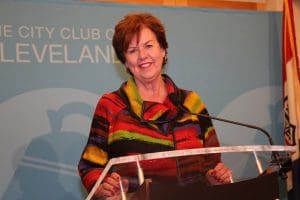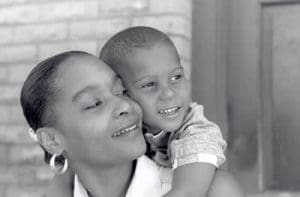I made a life changing decision in June 2017 to leave a job that I depended on as my safety net for 25 years to embark on an unknown journey. Passionate about workforce development, I interviewed for the service position with AmeriCorps NEO SKILLS CORP, an organization that provides services to low-income communities in the areas of Workforce Development and Financial Literacy. I had been interested in finding a way into this field for some time and I accepted the position within a matter of hours. My host site is The Council for Economic Opportunities in Greater Cleveland (CEOGC) and I teach inside of their existing Customer Service Certification Program, a six week program. I teach financial literacy five of the six weeks for a total of fifteen 1 hour workshops, and also teach in a four day Job Readiness Program, where I teach one day for 1 1/2 hours.
After attending training with my AmeriCorps manager, it was now time to perform my duties as a Financial Literacy Facilitator. I now had to determine how to incorporate the curriculum provided by my host site, AmeriCorps, with my own developed curriculum (approved by the host site manager and within the scope of AmeriCorps guidelines). My first day to teach class was the day after hire. What I didn’t know was this class was getting ready to graduate. That meant I had to teach 15 workshops in three days, give unit tests, and put together my presentations. I started the planning process with both curriculum, a few documents, the names and contact numbers of my other AmeriCorps members and AmeriCorps Manager, and some information from the past AmeriCorps member who held my current position the prior year.
Today, I have systems that I have developed, resources, researched material, sample folders for each workshop that mirror what I give to my class, a workshop schedule (my guide), workshop folders for each workshop that include my handouts and additional teaching points, 15 workshop/session curriculum, employees who want the information, people who receive individual coaching, and over 50 people who I have touched in some way with the information I have provided since September 2017. Beginning June 2018, I will start teaching Financial Literacy in the M.O.V.E.R.S (Millennial’s Occupation Vocation Education Resource Services) Program for young adults 18-24. This presents another challenge: “How do you get young adults to value financial information and understand why it should be important to them NOW?”
I have developed a passion for providing financial information to the community of people I service every day. I get so inspired when I see and hear how they use the information to improve their lives one step at a time. This proves the field of Financial Literacy is important to the lives of the people we can reach. I believe the field of Adult Financial Literacy is extremely important yet undervalued by most. The knowledge provided in a good financial literacy program can be life changing for many people. In my first workshop, I have my students start with the end in mind. For many of the students, this is the first time they have been asked to “Dream.” Some are reluctant, some are baffled, some do not know where to start, some are eager, and some think the activity is a waste of time (you can’t win them all). When I see the look on their faces as I present the material, I realize that I am empowering them, inspiring them, and giving many of them the hope that was lost or hope that never existed before in their lives. By the end of my first three workshops, most of my students know I believe in them. I realize, as the facilitator, I have to encourage many of them to believe in themselves.
As financial literacy professionals we must be able to reach people where they are in life if we want to truly change how people view the field of Financial Literacy and the professional within the field. For this reason, it is a must to find facilitators who are passionate about working with the population they service and truly seek to understand their issues and experiences.
A good Financial Literacy program should:
- Help people understand their current situation.
- Change the mindset that lead to their existing financial problems and behaviors.
- Provide financial knowledge to individuals that can be passed down to their children, grandchildren, etc.
- Give participants the platform to discuss various financial topics, share experiences, and learn new information.
- Help individuals determine their own financial destination and develop their own roadmap to reach that destination with the facilitator’s assistance.
- Introduce young adults to the knowledge early enough in life, so they can develop the mindset and ability to make informed decisions that will help them reach their financial destination. For some, this might be their first exposure to the financial information discussed in class.
- Show the more senior adults that it is not too late to think about their finances. A good program should also help them use the financial knowledge provided in the workshop to create a realistic financial destination for their lives.
- Offer some form of individual coaching opportunity if possible. For some people, finances are very personal.
- Encourage students to take ACTION.
I want to invite you to share your feelings about the nine reasons I highlighted above. I invite financial literacy facilitators to add to this list. This list demonstrates the true value behind a good Adult Financial Literacy Program.
After six months in the field, I can also identify a few struggles I have noticed and struggles that have been expressed to me during some of my workshops. The struggles are different for different age groups.
There are the 12 struggles I would like to highlight:
- Many professionals who service our student population fail to understand how the financial literacy field impacts their work with individuals and families.
- There is a vast need for more funding allocations/grants toward the expansion of financial literacy for people of all socioeconomic levels and all communities. There is a misconception that only low-income people are financially illiterate.
- There exists a great need to help people understand how having financial information and implementing what they learn into their lives can lead to better financial outcomes for themselves and their families. For some people, this translates into helping them build self-efficacy.
- One struggle facilitators might face is getting people to focus on implementing these practices if they do not have a job or income coming into the household.
- For senior adults, the struggle is getting them to first understand that it is not too late to do something to improve a bad financial situation. The second struggle is to get them to believe the information provided is still relevant to their lives.
- For young adults, the struggle is helping them to understand why they need to learn this information. Many young adults live for today. The need for future planning is a challenge for some young adults to grasp.
- Getting people to complete programs is a major struggle when they desperately need income to feed and provide a roof over their families’ heads. These people want work not programs.
- We often start much too late. Financial Education (as l like to call it) should begin as early as pre- school.
- We need to change the perception that only low-income people need financial literacy. I have many employees asking for the information for themselves. I had a doctor who felt he could use some financial education.
- We need to have facilitators who can act as a Peer-Coach. This person understands the experiences (that sometimes hold them back), struggles, and barriers that students face as they try to follow our recommendations. Some people need more than just the information if we want to see them succeed.
- Facilitators need accessibility to recommended local resources for issues beyond our scope of knowledge to share with the people we service, such as bankruptcy, consolidation, landlord/tenant housing assistance, tax advice, etc. All of these issues impact finances and a person’s ability to focus on the financial information we provide.
- It is often a struggle to get people to sign-up for a financial literacy only workshop or program. I am not an advocate for providing incentives to people to entice them to sign-up or complete a workshop or program that will benefit them at the end.
I believe we can work together to bring about meaningful solutions to these struggles. Here are some possible solutions I believe would make a great impact:
- Bring awareness to all stakeholders.
- The value of financial literacy needs to be highlighted to all professionals working with the people we service and financial literacy professionals need to be part of the conversation or preferably have a seat at the table. Some professionals may not be aware that at the root of their problem with the people they service is finances. It our job to make the connection.
- Financial literacy needs to be offered as part of an existing skills-based workforce program that lead to real job placement. Let people know that financial literacy is part of the program.
- Encourage employers to offer their employees financial literacy workshops. Many employees approach me for the information to use in their personal lives.
- Provide funding (grants) for communities and/or financial literacy professionals to develop workshops or special events in communities where financial literacy workshops do not exist inside existing community programs.
- Encourage facilitators to learn about and understand the lives of the people they service. Cultural competency is important when you are trying to direct people.
- Find people who are passionate about working with certain student populations and helping them grow economically. It helps tremendously when a facilitator believes in people even if they do not believe in themselves.
- Provide professional development opportunities for financial literacy facilitators that will help us to better serve the people we facilitate. There are many certifications we can take advantage of to increase our knowledge on the topics we teach in our programs. We need to connect with some of the associations that provide these certifications.
- Consider a contextualized curriculum for financial literacy when possible. Being able to make the connection for students will help them to see the value of a good financial education.
To learn more about NEO Skill Corps, click here


 As we each do our part to improve literacy in our community, more and more we see the need to coordinate and align our services. Literacy cuts across all sectors and spans a lifetime. From employers to clinics and schools, for children and adults, we need to focus our efforts on improving the skills of the whole family in all aspects of life. It’s a big commitment, but one we can do together.
As we each do our part to improve literacy in our community, more and more we see the need to coordinate and align our services. Literacy cuts across all sectors and spans a lifetime. From employers to clinics and schools, for children and adults, we need to focus our efforts on improving the skills of the whole family in all aspects of life. It’s a big commitment, but one we can do together.